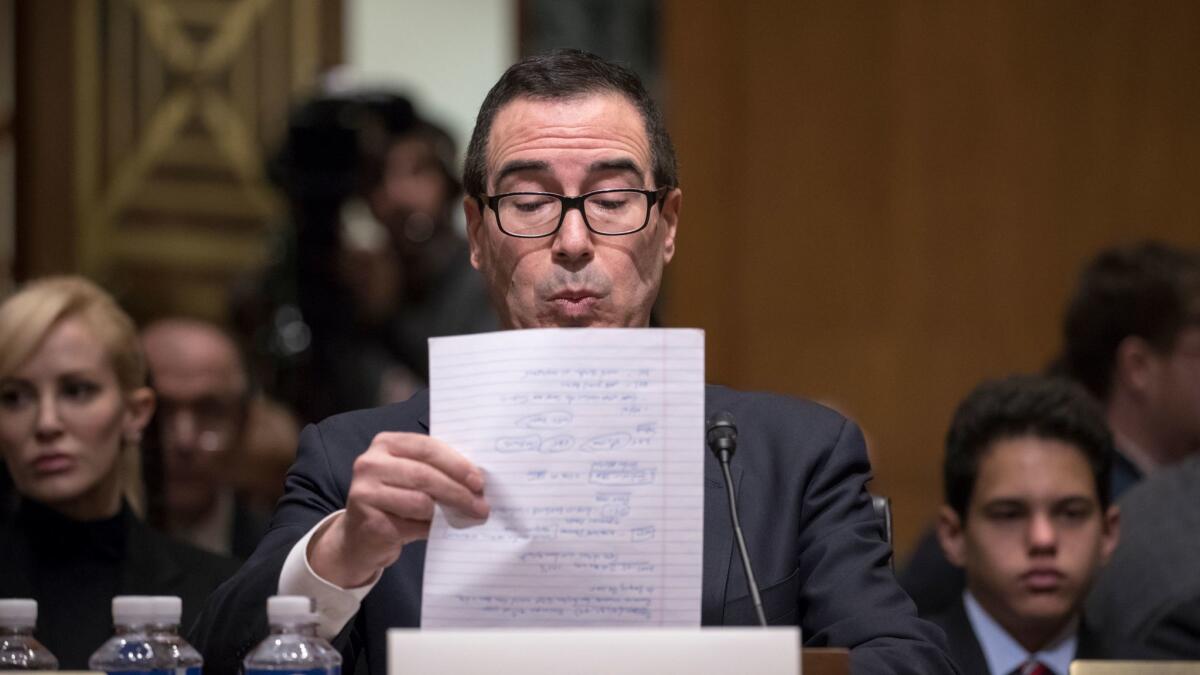Column: Did Steve Mnuchin and Louise Linton really ‘give more to the economy’ than they took? The record says no

Louise Linton, the actress-model-whatever wife of Treasury Secretary Steve Mnuchin, already has apologized for a certain nasty Instagram post aimed at a citizen who criticized her for bragging about her designer wardrobe during an official trip with her husband.
We’re not all that interested in the controversy over Linton’s Instagram posts per se, one of which was a childish outburst directed at Jenni Miller, an Oregon woman who had tagged Linton’s original post as “#deplorable.” We’re more interested in Linton’s comments about the economic contributions she and her husband make.
“Have you given more to the economy than me and my husband?” Linton asked Miller. “Either as an individual earner in taxes OR in self sacrifice to your country? … Pretty sure the amount we sacrifice per year is a lot more than you’d be willing to sacrifice if the choice was yours.”
While Mr. Mnuchin was CEO, [OneWest Bank] proved it could put more vulnerable people on the street faster than just about anyone else around.
— Sen. Ron Wyden (D-Ore.) examines one way Treasury Secretary Steve Mnuchin contributed to the economy
These are substantive assertions subject to factual analysis. So let’s ask: How much have the Mnuchins “given” to the economy? Are they paying their fair share of taxes? Are they sacrificing?
Leaving aside that sacrifice is in the eye of the beholder, we do know plenty about Mnuchin’s wealth, thanks to public records and disclosures connected to his confirmation hearing in January. The hearing examined the former Goldman Sachs investment banker’s activities as an independent investor. The evidence indicates that the Mnuchins are eligible for some of the most lavish tax breaks offered to any Americans, including a unique break available only to appointees to high-level executive branch jobs. They may pay more in taxes on an absolute basis than, say, Ms. Miller, but it’s also possible that they pay a smaller percentage of their income than she does. As for whether they pay enough, or their fair share, we’ll leave that up to you.
Let’s start with a couple of the biggest breaks. The biggest is the capital gains tax. The top tax rate on these gains from investment income is currently 23.8%, a big discount from the top rate of 43.4% on wage income. The capital gains tax, moreover, is additionally beneficial because (as USC tax expert Ed Kleinbard reminds us) it’s the only voluntary tax — it’s paid only when the investor decides to sell an asset with an embedded gain.
If the investor manages to hold the asset through death, the tax is extinguished for his or her heirs. Given that one can benefit from investment assets without selling them, say by borrowing against them or selling options on them, the capital gain tax offers investors the opportunity to have their cake and eat it too. You can’t do that with wage income, which is taxed in the year it’s received. Score one for Mnuchin, much of whose estimated $400-million wealth is in investment assets.
The special break for executive branch appointees such as Mnuchin is especially relevant, given Linton’s implication that she and her husband are making a “sacrifice” because of his government service. The law allows appointees forced to divest investment assets to avoid conflicts of interest to defer the cap gains tax on those sales, as long as they reinvest the proceeds in treasury securities or index funds. The tax isn’t incurred until and unless those replacement assets are sold.
We don’t know if Mnuchin has taken advantage of this provision, but it’s proper to explain how it might work to his advantage. Say he wishes to rebalance his portfolio by selling some stocks or bonds and buying others. If those sales would incur capital gain tax, he can now do that under the guise of avoiding a conflict of interest, and defer the tax indefinitely. By the way, since Treasury Secretary Mnuchin will play an important role in trying to legislate a capital gains tax cut as part of President Trump’s tax plan, he still would have a conflict of interest.
As a former hedge fund operator, Mnuchin also may well have been the beneficiary of the notorious “carried interest” loophole. This allows the general partners of investment funds such as hedge funds to declare their income from the funds as capital gains; critics of this provision say the income should be treated as ordinary income and taxed at the higher rate. During the presidential campaign, Trump advocated closing the loophole; Mnuchin recently implied that it should stay for certain taxpayers. Interestingly, he made that comment during the official trip to Kentucky that generated the troublesome Instagram exchange between his wife and Ms. Miller.
Mnuchin’s hedge fund activities themselves could be tax loopholes on steroids. Sen. Ron Wyden (D-Ore.) observed during the confirmation hearing that a Mnuchin fund had set up “outposts in Anguilla and the Cayman Islands, an action that can be explained only by the island’s zero percent tax rate.” He charged that millions of dollars in gains from Mnuchin’s Hollywood investments, including in the movie “Avatar,” were “funneled to an offshore web.”
During testy questioning at the hearing, Wyden got Mnuchin to admit that his fund had no employees, no clients, and not even an office on these offshore islands. Mnuchin asserted that the offshore domiciles were set up primarily to benefit nonprofits and pension funds that wished to invest there. He denied he benefited personally: “I paid all my taxes as required,” he said.
The Mnuchins reap other tax benefits available chiefly to the rich. They own multiple mansions on which property taxes are deductible. Consider just one of them, a nine-bedroom, 10-bath house at 969 Bel Air Road, Bel-Air, that Mnuchin bought in 2009 for $26.5 million. The property tax on that property was $345,683 last year, according to Zillow. Assuming Mnuchin itemizes his deductions, which is a fair bet, America’s taxpayers may have subsidized his tax bill to the tune of as much as $149,730.
That’s not counting the mortgage-interest deduction Mnuchin could take if he borrowed to buy whichever properties he designates as his first and second homes. This break isn’t that large, since it’s limited to the interest on loans totaling up to $1 million. But the deduction is heavily skewed toward wealthy taxpayers.
Finally, let’s examine what Mnuchin may have contributed to the economy as a business executive. The best place to look may be his leadership of OneWest. This was a bank that arose from the ashes of IndyMac, a failed Pasadena thrift. As my colleague James Rufus Koren reported, compared to other banks its size, OneWest made far more in loans to private equity firms, enabling them to buy companies, than direct loans to small businesses.
Democrats also hammered Mnuchin over OneWest’s reputation as a foreclosure machine, driving homeowners out of their home during the mortgage crisis. “While Mr. Mnuchin was CEO,” Wyden said, “the bank proved it could put more vulnerable people on the street faster than just about anyone else around.” Mnuchin defended the bank’s record, saying it was heavily involved in restructuring mortgages to keep people in their homes.
Linton’s general attitude is familiar among the rich: It’s the assertion that they’re giving up a disproportionate share of their wealth to support an army of unappreciative little people. In fact, the truth may be just the opposite. They benefit more from public services than the average American. They rely more on the courts and law enforcement to protect their wealth than ordinary Americans. They’ve built their fortunes with the help of employees educated on the public dime, on reliance of the transportation infrastructure paid by taxes, including the taxes they begrudge. If America’s infrastructure and national defense system collapse, they have more to lose.
That’s where Linton’s rant gets things exactly wrong. They’re not “sacrificing” for the rest of us. They’re paying for themselves. And quite possibly not nearly enough.
Keep up to date with Michael Hiltzik. Follow @hiltzikm on Twitter, see his Facebook page, or email michael.hiltzik@latimes.com.
Return to Michael Hiltzik’s blog.











